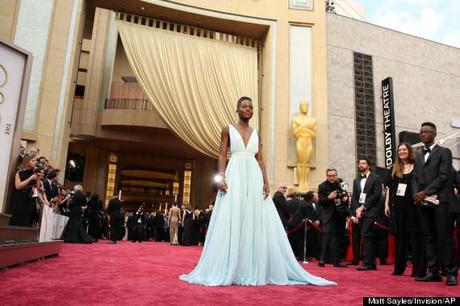Lupita. Lupita. Lupita.

We can’t stop saying her name. Can’t stop commenting on how gorgeous she is. Can’t stop focusing on how glamourous she is. Can’t stop raving about her every fashionchoice. I love her. I can’t find any reason to not think she’s as fabulous as she seems.
We can’t stop saying her name. You get the feeling that a lot of time was put into news broadcasters and red-carpet-watchers practicing Nyong’o. (If you don’t know, you can hear her say it here.) After last year’s catastrophe over Quvenzhane’s, it would have been a crying shame for anyone to have gotten it wrong.
But one thing I haven’t heard people talking about is her acting, at least not as much as they talk about her looks. Like many Hollywood stars, this isn’t shocking; women, even after dazzling performances, are judged at the Oscars on account of their dresses, not about their performances on film. A true movie star must be the epitome of femininity; even my 6-year-old was confused as to whether Ellen was a “boy or a girl;” the suit threw her off in this setting, even though she sees me in pant suits. A Hollywood movie star actress (or actor!) is going to be judged on her looks; in this way, the infatuation over Lupita Nyong’o's looks is a testament to her being embraced equally as a movie star.
This kind of thing would normally bug me. Acting awards should be about acting, like singing awards should be about singing. We hate on the Grammy’s when we think a particular effort was a shoe-in, but given to someone else due to what we all think is shady politics, at least in part. We think music should be judged based on the sound, not based on who makes it. But we are all wrong. Music is as much about who makes it as what it sounds like. All art really is.
And it is the same with acting, I suppose. I personally still find something odd about a person who can take on multiple personas to the point that you don’t know the “real” them. I know we all do it even in ever-day life more pedestrian than Hollywood acting, but it’s the constant changing, the constant transformation different than the last film and the one before that and the one to come next. “Beauty,” as defined in a society of white supremacy, often makes that performance even more strange, when the beautiful stray from the life we have imagined for them; yet as it seems strange to have a stereotypically beautiful woman play a dejected single mother having sex with a white racist cop who is putting her husband to death, but not so strange to see a plus-size dark-skinned black woman who does not fit the traditional standards of beauty play an abusive mother welfare queen. And I wonder how strange it feels to see a dark-skinned African woman play a slave. And then a “beautiful” dark-skinned African woman play a slave. Does it seem like acting? Is it more “believable?” I don’t know. I haven’t seen the movie. I will, but I can’t say when. It’s a lot.
But, back to my point, which is really just the title of this piece. My daughter — the child who has been telling me that her white dolls are cuter than her black dolls, the child who saw only 5 black faces out of hundreds of girls at a dance convention last weekend and felt a certain kind of way, the child whose best friends at school are actually blond-haired and blue-eyed — that child saw Lupita walk up those steps, saw me, her mama, jumping up and down, and declared, ever so simply, “Beautiful.”
And that was the single best word I’d heard out of her mouth all night. And it made me happy.
